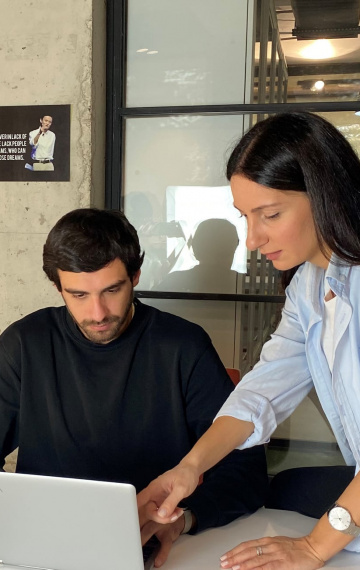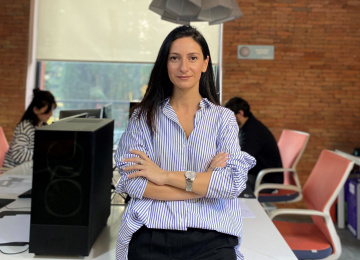
When developer Keti Vachiberidze started her online e-commerce platform, B2C.GE, in early 2019, Georgian businesses had little confidence in the power of online sales. Then 2020 brought the Covid-19 pandemic, and businesses were forced to close as lockdown measures took hold. For many, going digital was the only way to stay afloat. Thus, the unprecedented challenges of the pandemic presented B2C.GE with enormous opportunity.
The EBRD, with funding from Sweden, stepped in to help the company scale up and provide services to meet local needs. Now, the EBRD and the European Union (EU) as part of its EU4Business Initiative are making B2C.GE’s services accessible to smaller companies.
E-commerce means business
‘’We drew on best international practices and created an e-commerce platform that was appropriate to local needs,” says Keti of the early days. “But first, we had to reassure our clients that online shops were not a luxury, but generators of considerable income.”
In 2019, close to 150 shops were registered on the platform. That nearly tripled during Georgia’s first Covid-19 lockdown of March 2020. B2C.GE gave stores and brands without a proprietary website the opportunity to sell online.
‘’When everything stopped, we became busier than ever, even hiring new employees to help meet demand,” Keti says. “This helped us to identify the precise needs of local small and medium-sized enterprises.”
Here, the EU4Business support proved extremely useful. Through the Women in Business programme, the EBRD helped B2C.GE to engage local consultants to bring its functionality in line with that of global e-commerce platforms, to integrate its accounting systems, local payment options, delivery services and warehouse management systems, and to introduce mobile applications.
Today B2C.GE serves more businesses in Georgia than all other international platforms combined. The number of shops on the platform has increased by 135 per cent since project completion while the company’s sales were up more than 1,000 per cent in the busiest shopping months of 2020 (November and December).
‘’Back then, time was of the essence if companies wanted to keep the lights on,” Keti explains. “It was critical that they get online as quickly as possible. Hiring a developer for an e-commerce site takes time and requires considerable human and financial resources. In addition, with an ever-changing landscape and continuously upgraded payment systems, it is important to stay on top of things.”
Going a step further
Keti is a firm believer in the future of e-commerce.
‘’E-commerce is here to stay,” she says. “Customer behaviour has changed: we have less time to visit bricks-and-mortar stores. Already, around 60 per cent of people check products online prior to purchasing: the product does not exist if there is no information on the net. The pandemic has just accelerated this process.’’
According to a report by Galt and Taggart, the country’s leading investment banking and investment management company, however, even though e-commerce grew in Georgia in the first year of the pandemic, it still lags the rest of Europe. The country’s e-commerce penetration rate and spending per user are significantly lower than the European average.
To promote the uptake of e-commerce in Georgia, the EBRD and B2C.GE have once again joined forces and, with funding from the EU through its EU4Business initiative, are rolling out services for smaller companies. Eligible firms will receive training and support in digital marketing and their products will be put online, free of charge, to help grow their digital sales presence, expand their businesses and drive innovation.



